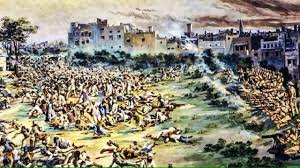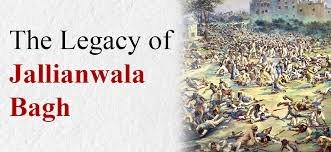Remembering the Jallianwala Bagh Massacre: A Grim Chapter in India’s Struggle for Independence
The Jallianwala Bagh Massacre, one of the darkest chapters in India’s fight for freedom, marks its 105th anniversary this year. The incident, etched in the annals of history, stands as a poignant reminder of colonial oppression and the sacrifices made by countless freedom fighters. As students preparing for various government exams, understanding the significance of this event is crucial not only for historical context but also for its socio-political ramifications that reverberate to this day.

Why this News is Important
The 105th anniversary of the Jallianwala Bagh Massacre holds immense significance as it serves as a stark reminder of the atrocities committed during the colonial era and the resilience of the Indian people in their quest for freedom.
Historical Context
The Jallianwala Bagh Massacre occurred on April 13, 1919, in Amritsar, Punjab, during the British Raj. It was a watershed moment in India’s struggle against British colonial rule. The massacre unfolded when British troops, under the command of Brigadier-General Reginald Dyer, opened fire on a peaceful gathering of thousands of unarmed civilians who had assembled at Jallianwala Bagh to protest against the oppressive Rowlatt Act.
Key Takeaways from “Remembering the Jallianwala Bagh Massacre”
| Serial Number | Key Takeaway |
|---|---|
| 1. | The Jallianwala Bagh Massacre occurred on April 13, 1919, in Amritsar, Punjab, during the British Raj. |
| 2. | British troops, led by Brigadier-General Reginald Dyer, fired upon unarmed civilians who had gathered at Jallianwala Bagh to protest against the Rowlatt Act. |
| 3. | The massacre resulted in hundreds of deaths and injuries, sparking outrage across India and the world. |
| 4. | The incident led to widespread condemnation of British rule and fueled the momentum of the Indian independence movement. |
| 5. | The Jallianwala Bagh Massacre remains a symbol of the sacrifices made by freedom fighters and continues to evoke strong emotions and debates on colonialism and justice. |
Important FAQs for Students from this News
Q1: What was the significance of the Jallianwala Bagh Massacre in India’s struggle for independence?
A: The Jallianwala Bagh Massacre served as a catalyst for the Indian independence movement, intensifying the demand for self-rule and highlighting the brutality of British colonial rule.
Q2: Who was Brigadier-General Reginald Dyer, and what role did he play in the Jallianwala Bagh Massacre?
A: Brigadier-General Reginald Dyer was the British officer who ordered the troops to open fire on the unarmed civilians gathered at Jallianwala Bagh, leading to the massacre.
Q3: How did the Jallianwala Bagh Massacre impact India’s relationship with the British Empire?
A: The Jallianwala Bagh Massacre led to widespread condemnation of British rule, souring relations between India and the British Empire and strengthening the resolve of Indians to fight for independence.
Q4: What was the Rowlatt Act, and why were people protesting against it at Jallianwala Bagh?
A: The Rowlatt Act was a repressive law enacted by the British government that allowed for the indefinite detention of individuals without trial. People were protesting against this unjust law at Jallianwala Bagh.
Q5: How is the Jallianwala Bagh Massacre remembered in India today?
A: The Jallianwala Bagh Massacre is commemorated annually on April 13th as a day of remembrance for the martyrs who lost their lives. It is also a symbol of India’s struggle for freedom and serves as a reminder of the sacrifices made by those who fought for independence.
Some Important Current Affairs Links

















